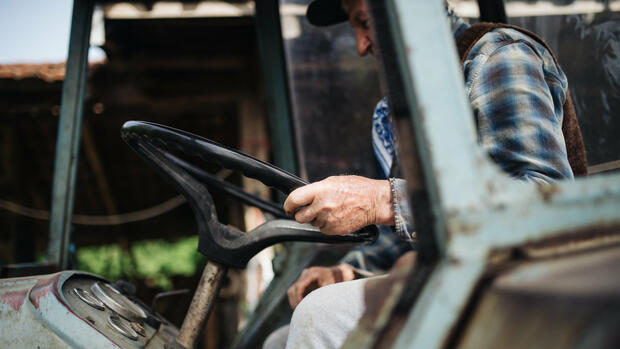Farming has changed a lot as a result of industrialization.
(Photo: mauritius images / Cavan Images)
Dusseldorf For a long time, rural agriculture was a proud business in Germany. It consisted of self-sufficiency, cattle markets and, above all, backbreaking work. Most of it disappeared rapidly, but still very quietly, in the second half of the last century.
Ewald Frie brings this time back to life in “Ein Hof und elf Geschwister” without looking back nostalgically. The main protagonists are eleven siblings born between 1944 and 1969. One of the siblings is Frie. All of them became professionally successful, often with the help of a degree. Only one person helped shape the change in the rural world – the eldest.
The author, a historian, is the third youngest sibling. For the book, he interviewed all his sisters and brothers, delved into local community archives, read agricultural weeklies, and cross-checked his very original findings with scientific literature.
The result is a profound, entertaining work about the transformation of a family farm – and at the same time an entire social structure. With meaningful scenes and examples, the Tübingen university professor shows how his parents’ world came to an end, how his siblings followed different life plans and how social change affected the Münsterland. Frie rightly won this year’s German Non-Fiction Prize for his work.
A large part of German post-war history is reflected in these memories and reconstructions: the change in family and farming society, work and celebrations, Catholicism and everyday religiosity, eating and drinking, games and school.
It’s about “real hardship”
It’s about the dwindling self-confidence of his father and his eldest siblings: at first they were certain that they were the only free people in the Federal Republic. They lived on their own land, did not have to adapt to their neighbors in terms of social behavior and made self-determined decisions about their lives and their daily routine.
They undoubtedly worked harder, longer, and dirtier than most other people. But they did not have to subject themselves to complex work-sharing structures like the “villagers” and especially “city dwellers”.
It’s also a lot about “real hard work”, i.e. work that nobody really liked to do before and often really hurt. The father worked conscientiously, persistently and hard. He assumed that his children would learn by observing and practicing and would follow his pace. Explaining or even discussing was not his forte. Carelessness, slowness and clumsiness were incomprehensible to him.
>>Read here: “Many farmers are struggling to survive”
But being a farmer was something nobody had to hide from. Everyone could see how they farmed, sowed, harvested, raised cattle and sold them at markets. Many could judge that. According to a survey from 1955, milking was the fifth activity that representative respondents thought they could do: after cycling, making soup, swimming and knitting, but ahead of driving a car or typing.

Ewald Frie: A farm and eleven siblings
CH Beck
Munich 2023
191 pages
23 euros
By the 1970s at the latest, industrialization had also spread to the individual farms. Financial capital was needed. The new challenges could no longer be solved from the substance of the farm, which provided a livelihood for all previous generations. In the past, work was a matter of course, but in industrial agriculture it had to be requested.
The historian was awarded the German Non-Fiction Prize for his book “Ein Hof und elf Geschwister” (One Court and Eleven Siblings).
(Photo: dpa)
Perhaps the greatest value of the wonderfully written book lies in the unasked question, which runs like a red thread through the almost 200 pages: Who is actually better off in terms of satisfaction and self-determined work? The farmer or the city dweller?
Am I a climber because I traded the farm for the university and scientist career? The author asks himself this in the conclusion and concludes: It is not the rise and fall that are decisive parameters for describing the many changes, but the worlds that have been pushed into one another and overlap.
Frie weighs soberly between himself and his extended farming family from the past: Today his apartment is much smaller than the living area on his parents’ farm. He has no land, no house, no animals, no apple trees and no hearth. Instead of honorary certificates, which his father earned as a cattle breeder, the author adorns himself with professorial titles and lists of publications. In the end, it amounts to a solid stalemate when it comes to the goal of a fulfilling life.
More: Emotional Artificial Intelligence – A new relationship between man and machine
